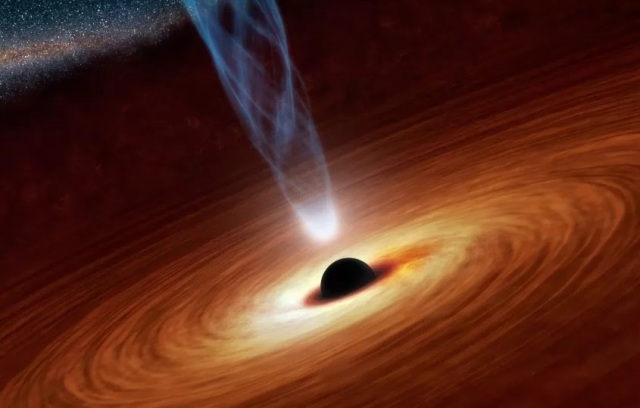Telset.id, Jakarta – A black hole explosion can occur suddenly. It can explode or be affected by the surrounding environment.
Black hole bursts are likely due to the sudden and brief release of large amounts of energy. What impact will there be?
Black holes are cosmic vacuum cleaners, objects so large that not even light can escape.
Most people imagine that a black hole does nothing more than sit quietly and devour any wandering bits of gas or dust.
The question is, could black holes really have a more interesting inner life? How do black holes suddenly explode?
Hawking radiation
There is a way a black hole can explode at any moment. The process behind this has to do with the fact that black holes are not completely black.
This fact was discovered by the famous astrophysicist Stephen Hawking in 1976. Even in classical physics, nothing can come of it.
“Hawking found that with quantum mechanics, black holes slowly lose energy indefinitely,” said Samir Mathur, a physicist.
The trick, he continued, was to emit low-energy radiation. Reported Live scienceaccording to Mathur, the process is called Hawking radiation.
Until it sucks in new matter, the black hole will slowly lose mass. This is because black holes emit what is known as Hawking radiation.
However, Hawking radiation is emitted slowly. A normal black hole with a mass several times that of the sun emits about one photon per year.
For your information, photons are packets of light. At that rate, a normal black hole would take 10 ^ 100 years for the process to completely evaporate.
However, Hawking noted that smaller black holes evaporate much faster. As it gets smaller, it emits more radiation.
In the last moments of life, fast black holes emit so much radiation and act effectively like bombs, releasing explosions.
Like it The phone Mentioned Tuesday (9/20/2022), the bursts emitted by black holes are in the form of radiation and high-energy particles.
So, if they formed in the early universe, tiny black holes the size of Earth would take several billion years to evaporate.
These “primordial” black holes will explode across the universe. However, astronomers have yet to find evidence of a primordial black hole explosion.
Super shine
Black holes explode with other types of explosions not found anywhere else in the universe. All thanks to the fact that black holes rotate.
The rotating black hole is named the Kerr black hole in honor of the New Zealand mathematician Roy Kerr who discovered how it works.
The rotating black hole creates an ergosphere around the event horizon. The ergosphere is an elongated region of space where nothing stops.
Just so you know, anything that falls into a spinning black hole begins to orbit as the particles have entered the ergosphere.
Space-time that revolves around a black hole can also attract photons. If there are enough photons, black holes can also bounce off each other.
Sometimes, reflection causes photons to escape from the ergosphere. But, at other times, the reflection causes the photons to fall deeper into the black hole.
With each iteration of the process and each journey around the black hole, the photon gains energy. This process is called super radiance.
When it is finally released, according to the astronomers’ research results, the photon will have a very large energy compared to when it started its journey.
If many photons participate in the process, an explosion with tremendous energy will occur, turning into a “black hole bomb” event.
Even if a black hole doesn’t explode, the super ray effect shows how strongly a black hole can affect its surroundings.
Giant accretion disc
The most common way black holes trigger explosions is not self-destruction, but the enormous force of gravity.
The supermassive black hole is at the center of the galaxy. Sometimes, large enough lumps of matter like stars pass too close together.
When that happens, the star will be torn apart due to the effects of the tides. The ripping process released a burst of energy with extremely explosive power.
Astronomers on Earth can witness the release of this energy in the form of short but intense beams of X-rays and gamma radiation.
In addition to tearing apart stars, giant black holes often collect swarms of matter that are constantly spinning in giant accretion discs.
The gigantic accretion disk reaches a temperature of quadrillion degrees, making it the brightest object in the universe, capable of rotating electric and magnetic fields.
https://www.livescience.com/can-a-black-hole-explode
–


